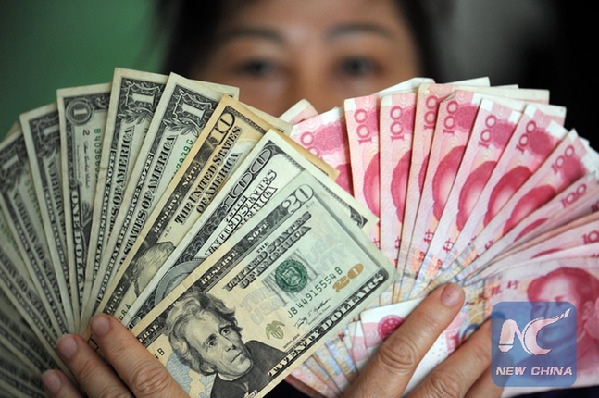PBOC vice governor: new Plaza Accord 'unrealistic'
 0 Comment(s)
0 Comment(s) Print
Print E-mail China.org.cn, February 29, 2016
E-mail China.org.cn, February 29, 2016
|
|
|
A residents shows China's RMB and US dollar banknotes in Qionghai, south China's Hainan Province, Jan. 7, 2016. [Xinhua] |
There has never been a plan to reach a deal similar to the Plaza Accord among G20 member countries and such a plan is unrealistic, said Yi Gang, vice governor of China's central bank.
The Plaza Accord, signed in 1985, was an agreement among five nations to depreciate the U.S. dollar relative to the Japanese yen and the German Deutsche Mark by intervening in the currency markets.
"The members haven't reached a consensus on the trend of the exchange rates and the current international currency system is very different from that when the Plaza Accord was signed," Yi said during an interview with Xinhua on Sunday, after the G20 Finance Ministers and Central Bank Governors Meeting in Shanghai.
Yi said the wording used in the meeting's communique, such as "we will consult closely on exchange markets," is unprecedented, highlighting the attentions paid by the members to recent exchange rates volatility.
"By consulting closely, we can coordinate with each other more flexibly and that will play a positive role in eliminating excessive fluctuations and disorderly adjustment of the foreign exchange markets," Yi said.
The meeting sent a clear signal that the group will "refrain from competitive devaluations," which is helpful to alleviate concerns over a "currency war," Yi said.
The exchange rate mechanism was among the focus of the two-day meeting, which concluded on Saturday.
For China, the currency yuan has been heading south since the government revamped the foreign exchange mechanism last year, and concerns about capital outflows have been on the rise.
Yi recognized some volatility on the yuan exchange rate, but said markets should not overreact, as the yuan's fluctuation range is still smaller than many other currencies.
The yuan exchange rate was also affected by some short-term speculations. But Yi said he is confident in the currency's fundamentals, which will drive the exchange rate in the long term rather than short-term expectations.
Speaking on concerns over capital outflow, Yi said the recent drop in China's foreign exchange (FX) reserves was mainly due to a rise of FX assets in residential accounts and a reduction of FX liabilities, which are not likely to last for long.
Financial policymakers from the world's 20 major economies on Saturday pledged to use all policy tools, including monetary, fiscal and structural ones, to strengthen global recovery amid growing concerns of further downward risks.







Go to Forum >>0 Comment(s)